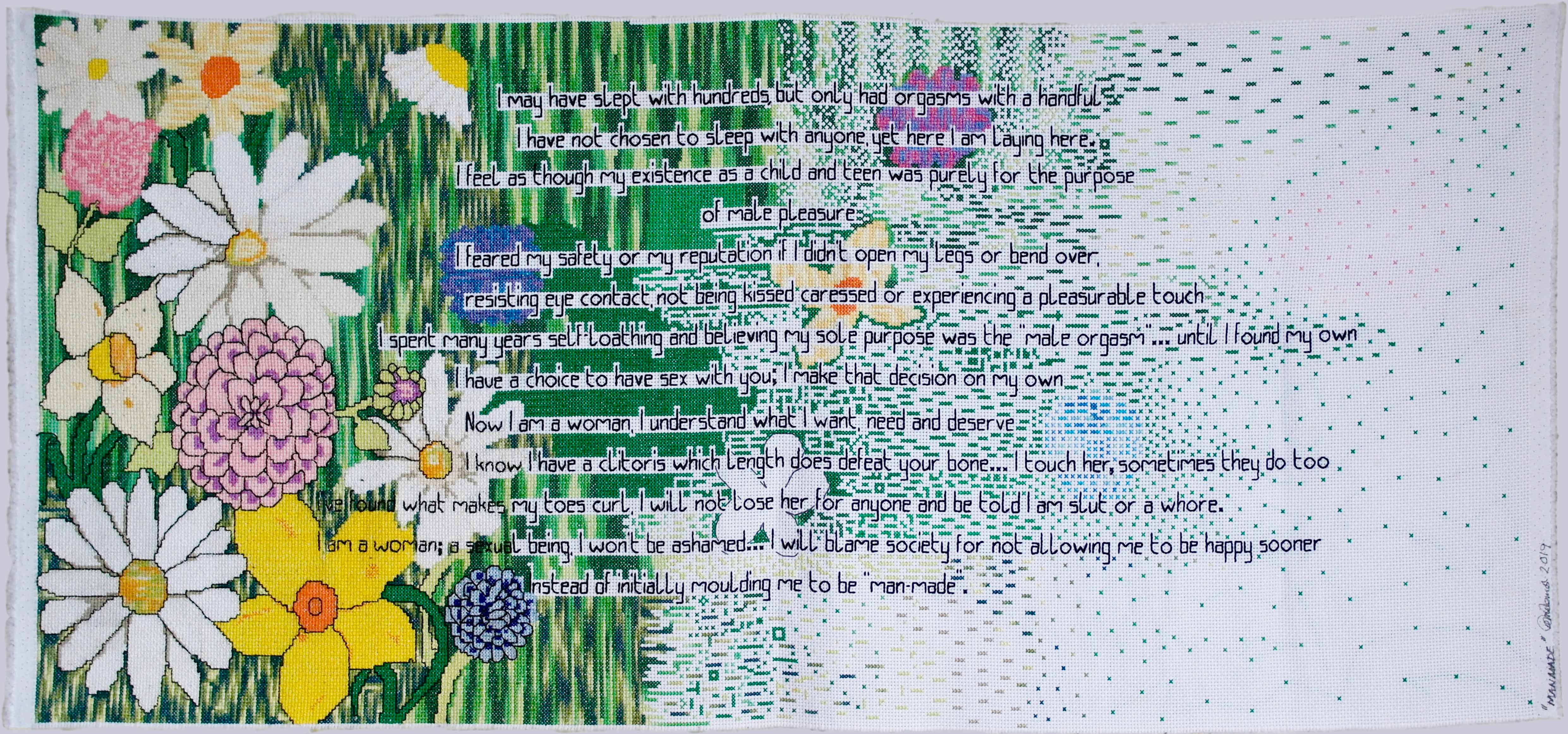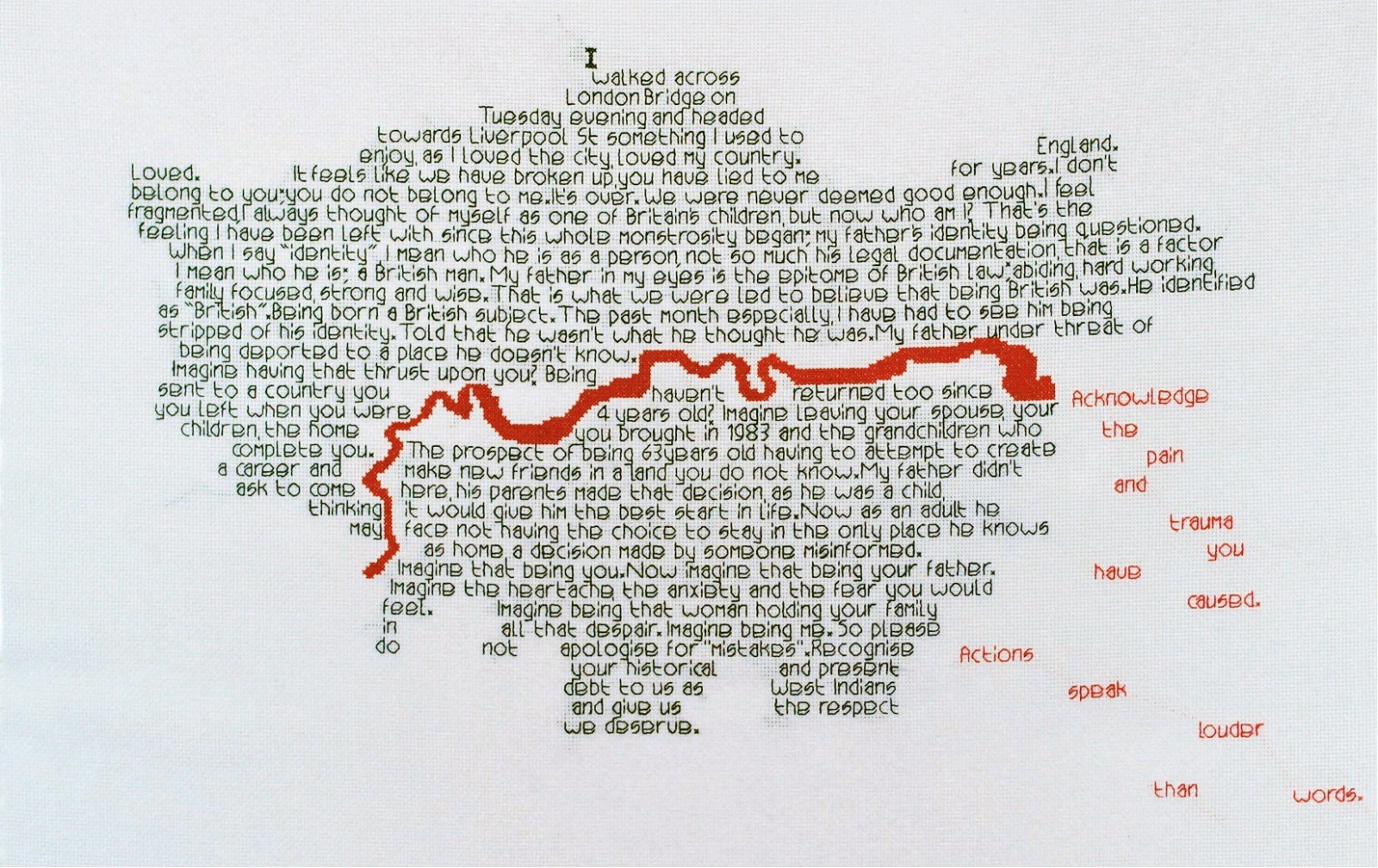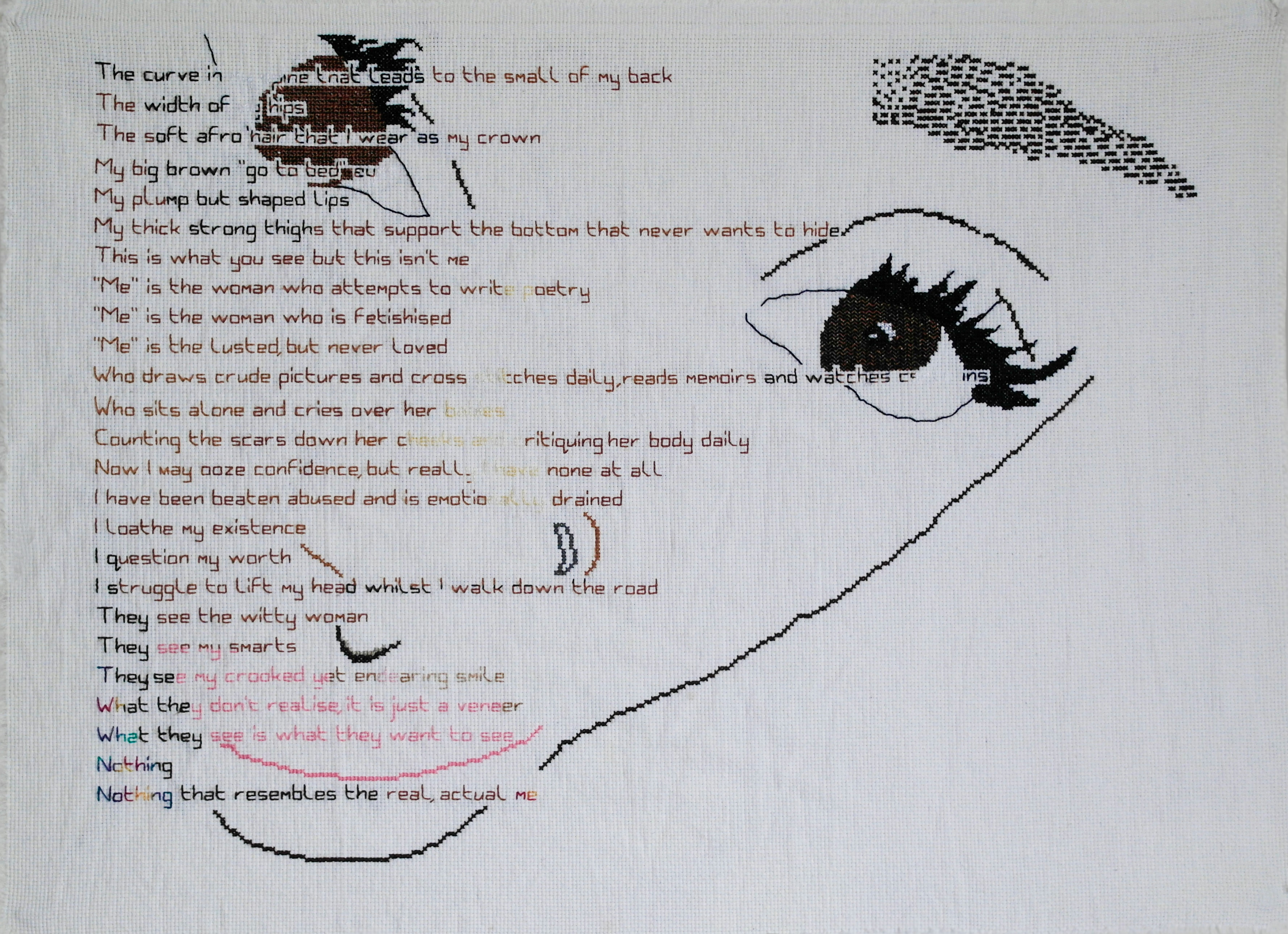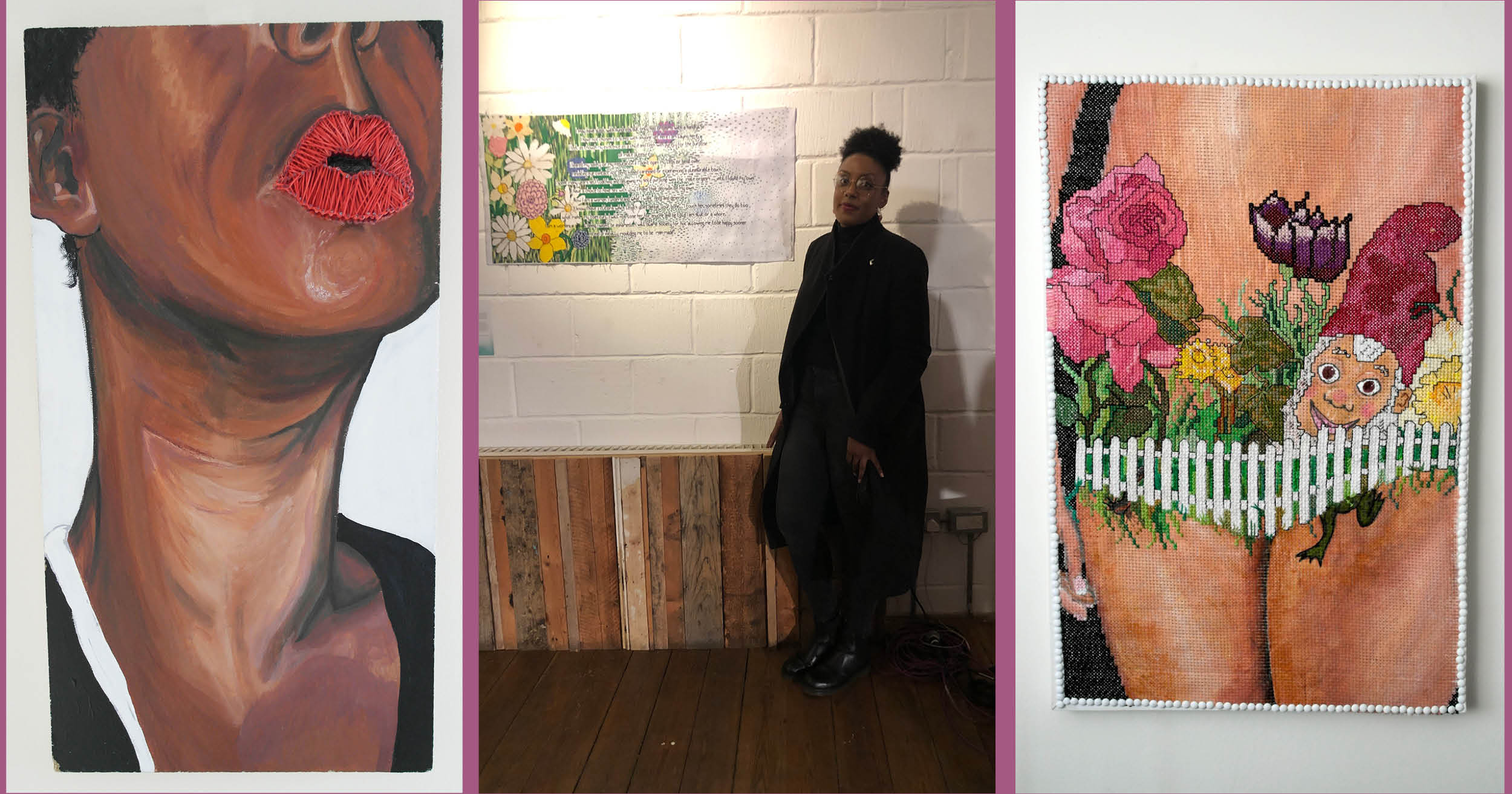Rachelle Romeo is a London-based artist who uses embroidery and thread amongst other mediums to convey powerful messages about heritage and identity.
The multi-dimensional works that Rachelle creates carry with them important messages and we were so pleased to catch up with her and find out a bit more about her, her work and the potential of using creativity as an outlet to speak truth.
Interview: Devon Turner in conversation with Rachelle Romeo

Rachelle, thank you for taking the time to speak with us. As an organisation that promotes advocacy and storytelling through drawing and making marks with meaning, we are eager to delve into your story and practice.
To begin, could you share your background with our audiences? How did your artistic practice first form?
I always had a strong pull towards art, as a child I would often draw as a form of comfort. That, and reading back then were my best forms of entertainment and escapism. Weekends with my father would be visiting art and craft stores where I would be able to be bought materials; I remembeer also cross-stitching back then. When I fell pregnant with my first daughter, I decided to pursue to professionalise my art practice and studied in the evenings whilst working in a school for adolescent young men with social, emotional and behavioural difficulties. I spent two years at the Working Man's College and then was fortunate to receive an unconditional offer from UEL. UEL was an interesting experience, but I managed to push myself there with the support of good tutors and technicians to find my own style and it continues to evolve.

We think of drawing quite broadly here at The Big Draw. We like to use the phrase, "making marks with meaning" as that incorporates drawing with other means like you do with thread. How exactly did you get started with a needle and thread? When did that become a preferred medium?
I mentioned above that I used to cross-stitch as a child, I think as a young girl even at school, you were pushed towards sewing. Although I went to a mixed school and all my technology classes were mixed, there was still an emphasis on sewing being very feminine. When I left school at the age of 16 in 2000, I was adamant I was going to become a graphic designer. Unfortunately, although being one of my most talented in my class, I was not fortunate enough to go onto my level three which was an apprenticeship part of the study programme. Post college, I would often play with Adobe Illustrator (my favourite) and Photoshop. As my practice began to develop at UEL; the pixel formation of images on the screeen I felt could be easily recreated using cross stitch, so the relationship with that medium began there in my recent practice. Needle and thread are very forgiving; you can change your mind and unpick quite easily; it is portable and focusing on stitching allows me to enter a medatitive state. You also can incorporate with paint, ink which I have done. It is very playful and can easily transform into my forever evolving mind when it comes to ideas.
You were born and raised in London and you cite your surroundings as well as your experiences and social interactions as your inspiration... Can you tell us more about what inspires you about London?
I have a very odd relationship with London, it is a town that I associate with belonging, but in recent years I find it isnn't my home, yet it is the only place I have lived. The reason being is because of how my father was almost deported and was one of the main faces of the 'Windrush Scandal'. I did a lot of activist work and campaigning to ensure he was able to stay in the UK and my piece 'Identity', 2018 was inspired by that traumatic event in our lives.
Being a black woman living in London of mixed heritage, I found it very difficult growing up here. I often felt isolated by society, media and on some occassions my own family. Although I have a better understanding of myself and how others have treated me due to maturity and being fortunate to have found myself positive people to be around, I live to tell the tale.
I don't blame London, but I enjoy making connections with other quirky like-minded individuals who exist without anything they can relate too, mirroring how I've felt for so long. I create art for those people. London can be lonely, it can be beautiful, it's hard for a lot of people. It's so congested it is hard to get lost... so by sharing my experiences of being a working-class Londoner; my social interactions and aspects of my life and other, I would hope I would be able to give others a sense of company that lifts that loneliness. We feel we are the only person in the world who thinks and experiences these things, that normally is not the case.

You are a founding member of Windrush Action; a grassroots organisation who supports people affected by the Windrush Scandal and to share information to allies in the wider community. Can you tell us more about this work and its importance?
Unfortunately, I am not an active member of 'Windrush Action' due to difference of opinions and schedules, but I was a founding member. My father is still chair and he and other members are still liasing with the community and in some cases government officials to look at and improve the treatment of commonwealth migrants.
I believe it is very important to speak about British History, I truly feel that if we were all educated about all the aspects of British History especially the British commonwealth, we would live in a more tolerant place. I would hope that 'Windrush Action' will be able to support that happening like other organisations such as Runnymeade Trust and JCWI who work timelessly to educate us and offer support to migrants in the UK. I believe the Department of Education have done the British people a disservice by foccusing on other aspects of history rather than teaching our dark past. We all have the right to know where we came from and how it came about. It's ethical.
In addition to your artistic practice, you also do a lot of public speaking and are a self-proclaimed mental health advocate. Do all of these facets tie together somehow? Do you believe that drawing has the power to affect wellbeing and that visual literacy is important?
I began studying counselling when I was 19, unfortunately I was working as a cashier at Abbey National when I started and then as Learning Support Assistant so I couldn't afford to finish my studies due to the high financial demand back then - both roles not very well paid. I think with advance learner loans and such it is easier now. I managed to get my CPCAB Level 3 qualification and had to stop when I was 22.
Whilst working in education from the age of 20, I mainly supported young people with social and emotional difficulties with the occassional moderate learning difficulty. I always felt from my own experiences that if someone took the time to look past the exterior and allowed a person to access education in a different way, anyone could benefit from learning and enjoy it. Education is important and sometimes misunderstanding one's behaviour can cause a lot of barriers.
I have worked in education on and off in pastoral care for about 13 years and I also spent three years working as a counsellor for ChildLine. My role at ChildLine was the best job I have ever had, but unfortunately due to unforeseen circumstances and personal difficulties, I had to leave.
Do you use art as a means of therapy/healing?
I myself have suffered from anxiety the majority of my life. I was diagnosed when I was 19; I manage it through diet, exercise and art. I do not judge anyone in how they choose to manage their mental health as everyone is unique and has to do what is best for them. I believe there is a lot of taboo about mental health and we should be having more open conversations about it, it is very common and links to your physical health; one cannot function without the other. The shame and guilt allow a lot of us to maintain poor mental health, we live about it in fear of being judged which then causes it to escalate which is not okay.
I am currently halfway through becoming a MHFA insturctor, with my professional and personal experience I know how important it is to be informed and I would like to do my part informing others.
I believe that creativity whether it is drawing, dance or spoken word can really enhance your mental wellbeing. It gives you a sense of relief, not everyone is a good communicator - I am not the best , yet, I can share my experiences through word and thread which embeds my turmoil and turns it into something if I can say so myself; something beautiful. Seeing all your pain being transferred into beauty is a great thing; Especially if it can also soothe others. Some pieces have brought some to cathartic tears as well as laughter and I am glad.

As if you weren't multi-faceted enough, you are also a life long learning teacher trained with SEN specialism and separate counselling qualifications. Touching upon education, especially arts educatiomn in schools, do you believe that art can be a conduit for learning other subjects? If so, why should "All schools be art schools" as our Patron Bob and Roberta Smith so often says...?
All schools should definitely be art schools. I think not everyone is academic, but everyone can be creative. We often associate intelligence with grading and academia, but there is more to the human mind than that. There are so many mediums to express yourself differently, surely that is good for the soul?
School I think is where you do the majority of your growing and it is such a traumatic time for young people. I am still recovering from the conditioning of my worth that occurred during my secondary years. If a young person is supported to be able to express themselves and be applauded by their efforts and it happens to be through art, then why not? I taught art to a Special Educational Needs class in the college I work at to support my teaching qualification, at the end of their term with me they held an exhibition showcasing all their artworks and were able to talk about contemporary masters. It worked because that is what it should be naturally.
Within the arts sector, there are issues with diversity and equal representation especially concerning Black artists. With the momentum behing the Black Lives Matter movement, what kind of change would you like to see?
I would like to see that this would no longer be a question. I would like to see a day when there are no more "black artists" or "black history months" because we would be so incorporated within society we would be accepted on our talent and our merit alone. We wouldn't be "niche" or a "taboo" subject.
I am proud of being black, but we have existed on this earth longer than most, therefore why are we always being penalised? Why do people create narratives to promote fear and predjudice against us? Why can't we just walk side by side and be treated the same way; we all bleed when we are cut. I am an Artist. I might be a black female, but I am an artist. I should have the same opportunities regardless of intersectional prejudices. That would be a glorious day, I hope it will be in my children's lifetime.
It has been a difficult time for me recently; growing up in a working-class area like Edmonton as a child which at that time was mainly white British was difficult - I was born in 1984. Being different, being targeted due to narratives created by my oppressors was beyond hard and not deserved.
BLM is a much needed movement and I support it, but it does bring up a lot of PTSD for me as I am tired of reliving my trauma to educate people. I am hoping that we will come together and finally understand that no one should be disadvantaged by the colour of their skin.

Finally, what advice would you give to young creatives, especially black and minority ethnic artists who may feel discouraged because they don't see themselves represented within the arts sector?
Keep doing you. Remember, you may be knocked down 10 times in a row, that just adds to your resilience. It hurts when people don't recognise your talent, or they dislike your body of work. It's okay because art is for everyone, therefore there is someone out there who is waiting for an artist like you. Keeping making, when an artist stops making it hurts. Don't cause yourself pain, continue to work because your time will come. Build yourself a network of good people with good intentions who will pick you up when you fall in the time you are waiting to be seen, then they will be there to celebrate your success with you.

If you were inspired by this interview with Rachelle and would like to find out more about her and her work, click here. You can also follow her on Instagram @rachelleromeoartist
Registrations are now open for The Big Draw Festival 2020: A Climate of Change! Find out more about the benefits of becoming an organiser here and other ways to support The Big Draw's mission here.
